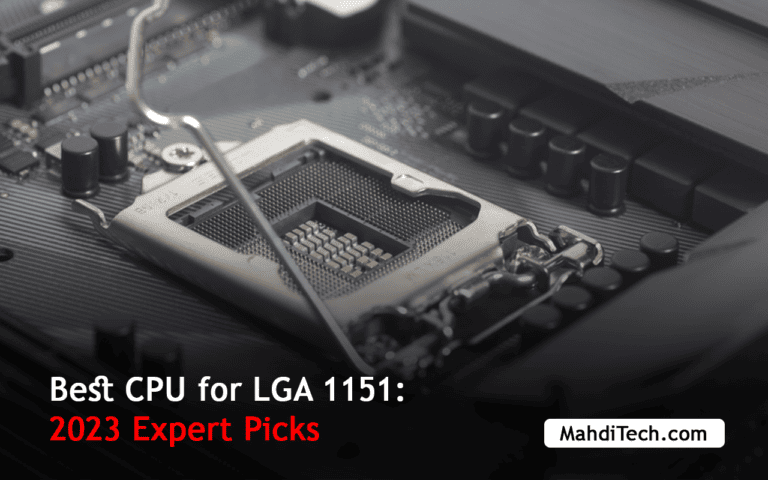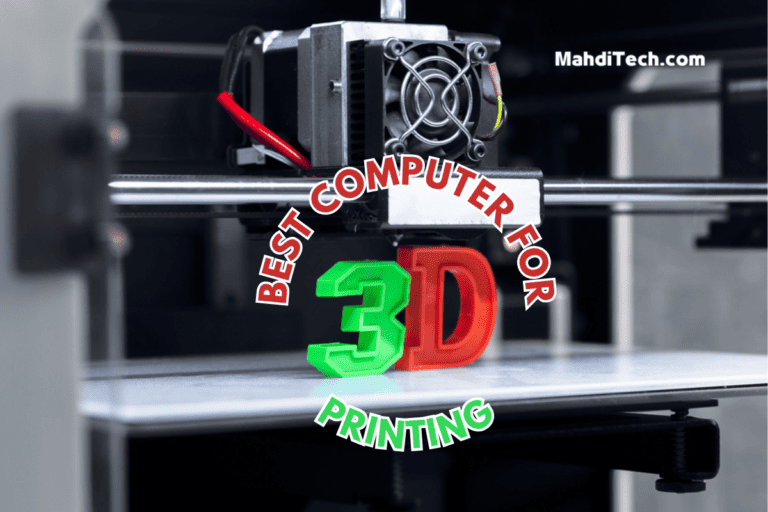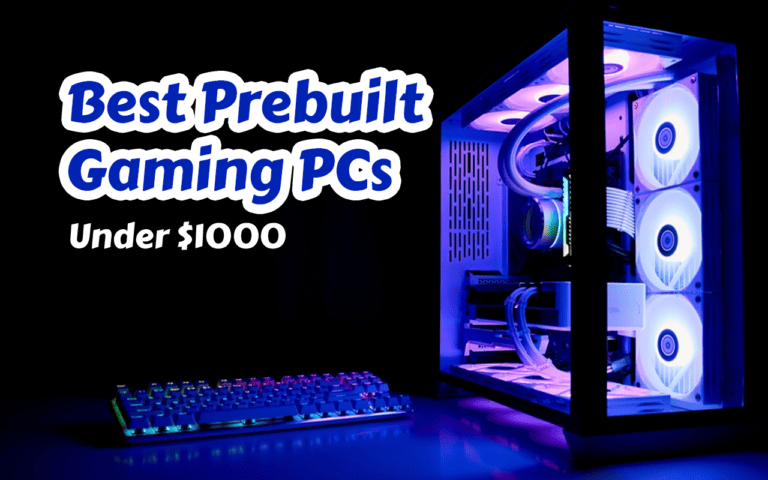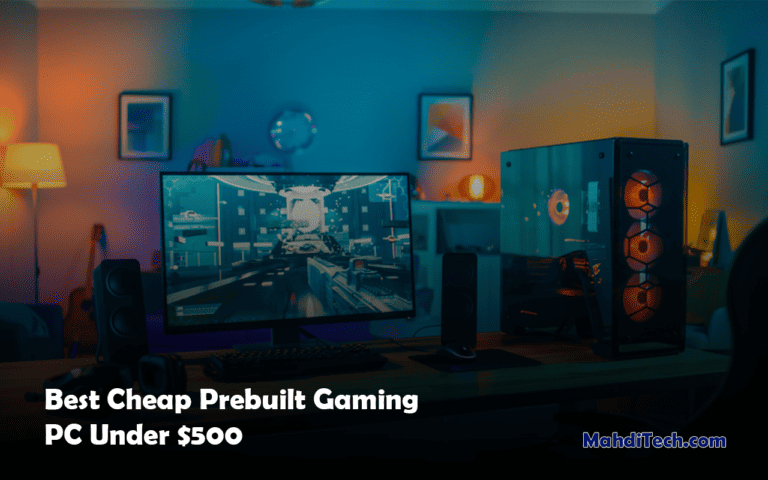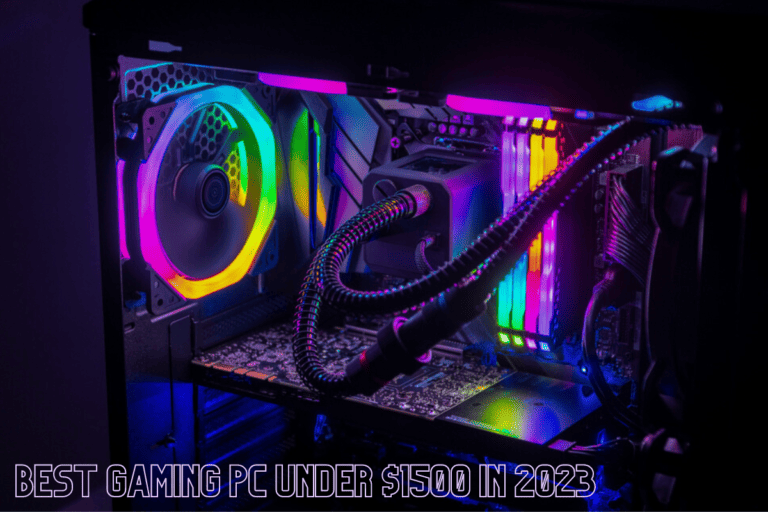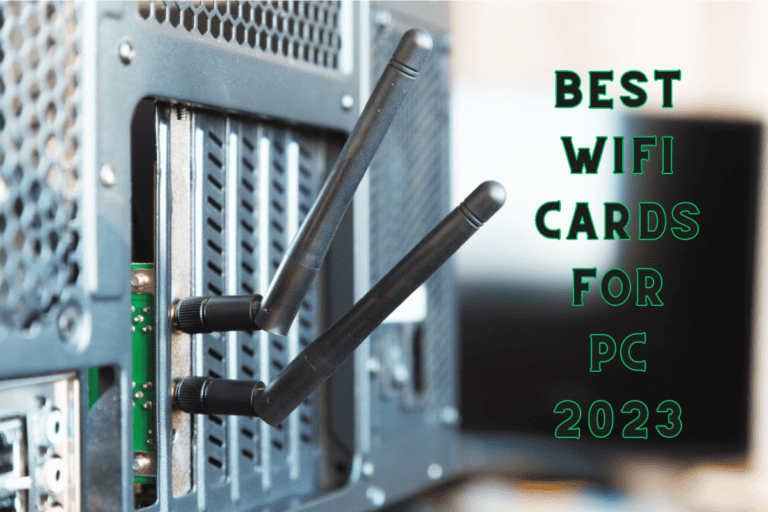
As a computer science student, finding the perfect laptop can be daunting. You need a device that can handle complex programming tasks, run multiple software applications, and efficiently execute heavy simulation programs.
With so many available options, choosing the right laptop that meets all your needs can be overwhelming. The excellent news is that we’ve done the hard work for you and compiled a comprehensive list of the best laptops for computer science students in 2023.
This article delves into each laptop’s specifications, features, and benefits, helping you decide when investing in a new device. With our expert guide, you’ll be able to find the perfect laptop that matches your goals, budget, and lifestyle.
What are The Best Laptops for Computer Science Students?
You’re a computer science student looking for a powerful laptop that won’t die halfway through a coding marathon.
Well, look no further, my friend. This article will show you the best laptop for computer science students.
That device has a long battery life, a powerful processor, and an operating system that can handle all the programming tools you will be using.
Here are my top picks for the best Laptop for Computer Science Students this year:
1. Apple MacBook Pro 14-inch
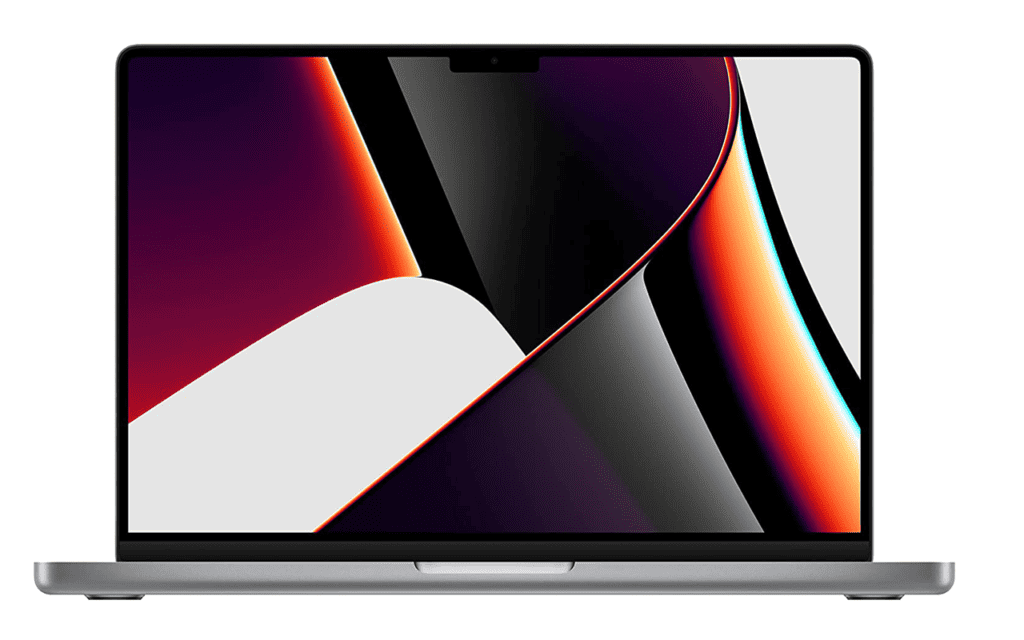
Overview:
We are introducing the Apple MacBook Pro 14-inch (2023) – an exceptional laptop for computer science students.
It boasts a powerful M1 processor, a stunning Retina display, and a sleek design perfect for coding and designing projects.
With up to 20 hours of battery life, this laptop is a must-have for any student looking for performance and portability.
MacBook PRO 14-INCH 2023 SPECS:
- Processor: M2 Pro (10-core CPU, 16-core GPU or 12-core CPU, 19-core GPU)
- RAM: 16GB
- Storage: 512GB to 8TB
- Screen: 14.2-inch Liquid Retina XDR
- Battery Life: Up to 14 hours of web browsing
What I Like and Dislike about MacBook Pro 14-inch:
Like:
- The M2 Pro chip delivers impressively fast performance.
- The 14.2-inch Liquid Retina XDR display is truly stunning, with mini-LEDs providing its power.
- The battery life is long, and the standby time is excellent.
- If you’re searching for a modern and highly responsive keyboard with plenty of ports, your hunt is over!
Dislike:
- The cost is higher compared to the competitors.
2. Asus ROG Strix G17
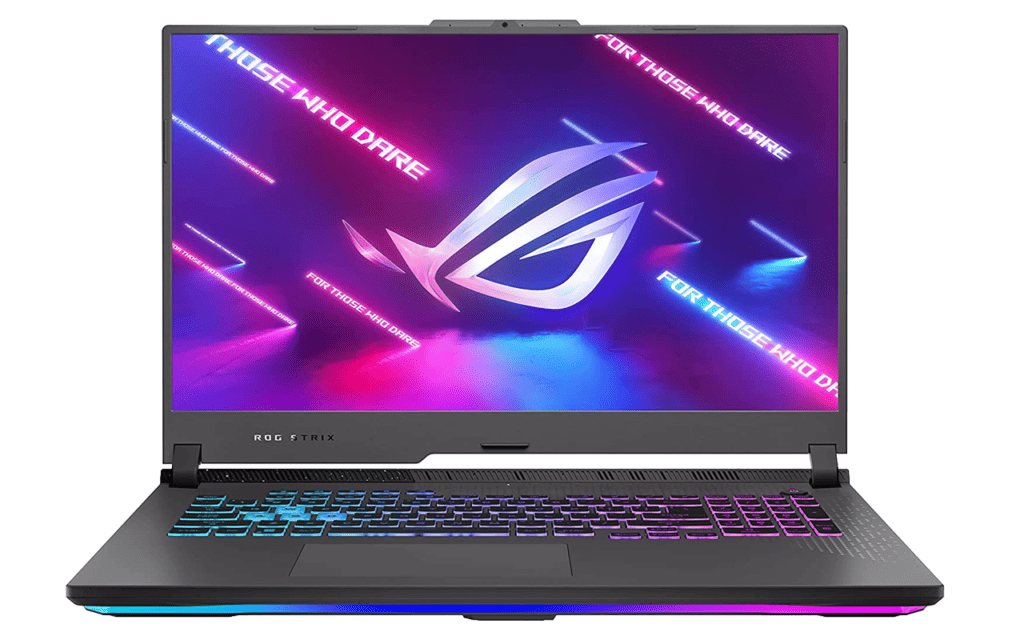
Overview:
The Asus ROG Strix G17 is a top pick for computer science students who are also gamers.
This programming and gaming laptop is robust, with advanced capabilities, dedicated graphics, and a powerful Intel Core processor.
With its high-performance hardware, it delivers smooth gaming experiences and supports resource-intensive tasks.
The ROG Strix G17 is an excellent gift for tech-savvy individuals who pursue computer science, providing the perfect blend of gaming and computing power.
Asus ROG Strix G17 Specs:
- Processor: Ryzen 7
- Graphic Card: Nvidia GeForce RTX 3060
- RAM: 16GB
- Storage: 512GB SSD
- Screen: 17.30-inch
- Battery Life: Up to 13 hours and 20 minutes of Web browsing
What I Like and Dislike about Asus ROG Strix G17:
Like:
- I enjoy the feel of optomechanical keypresses. The screen options are quite intriguing, particularly the QHD 165 Hz.
- The battery performance is exceptional.
- Even during extended gaming sessions, the palm rest area remains relatively calm.
- This device is equipped with WiFi 6 technology.
Dislike:
- The device lacks a card reader, Thunderbolt port, camera, or biometric features.
- The cost is relatively high.
- Expensive Laptop
3. Dell XPS 15
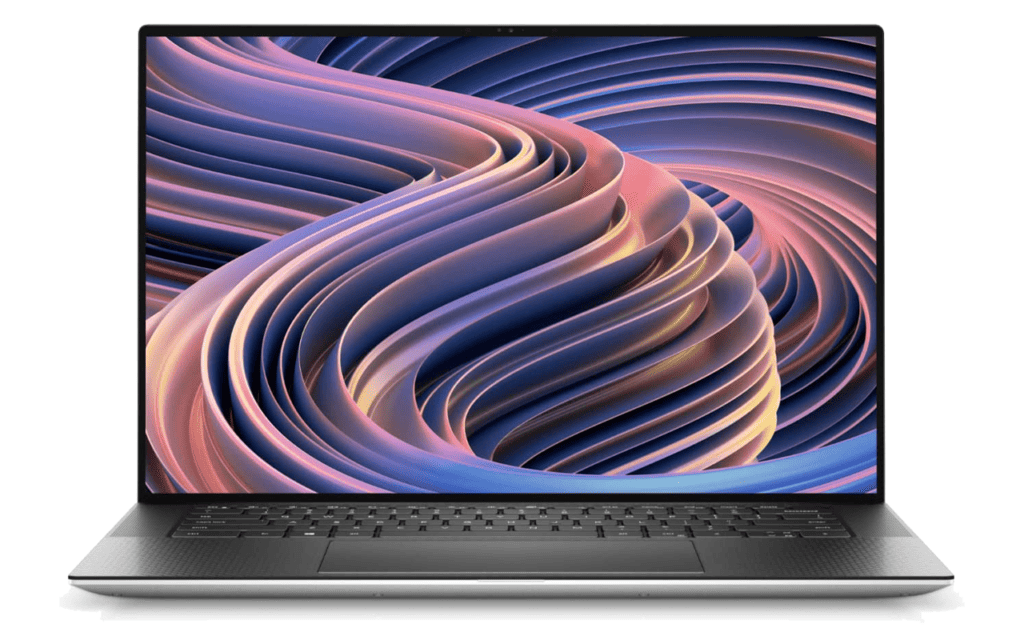
Overview:
The Dell XPS 15 is a high-performance laptop often recommended for computer science majors; it boasts a powerful 12th-generation Intel Core processor and up to 32GB of RAM, making it an excellent choice for running complex programming tasks and software applications.
While the XPS 15 is not necessarily a budget laptop, its features and performance justify the cost for those who need a reliable and efficient machine for their studies.
The Dell XPS 15 is a top-performing laptop well-suited for computer science majors requiring a powerful and versatile device.
Dell XPS 15 Specs:
- Processor: 12th Gen Intel® Core™ i5-12500H
- Graphic Card: Intel® Iris® Xe Graphics
- RAM: 16 GB
- Storage: 512 GB, M.2
- Screen: 15.6″, FHD+ 1920 x 1200, 60Hz
- Battery Life: 6 hours of longevity
What I Like and Dislike about Dell XPS 15:
Like:
- This product boasts an appealing premium chassis. The display is stunning and captivating.
- The overall performance was excellent.
Dislike:
- Lackluster webcam
- There are only three USB-C connections available.
4. HP Spectre x360
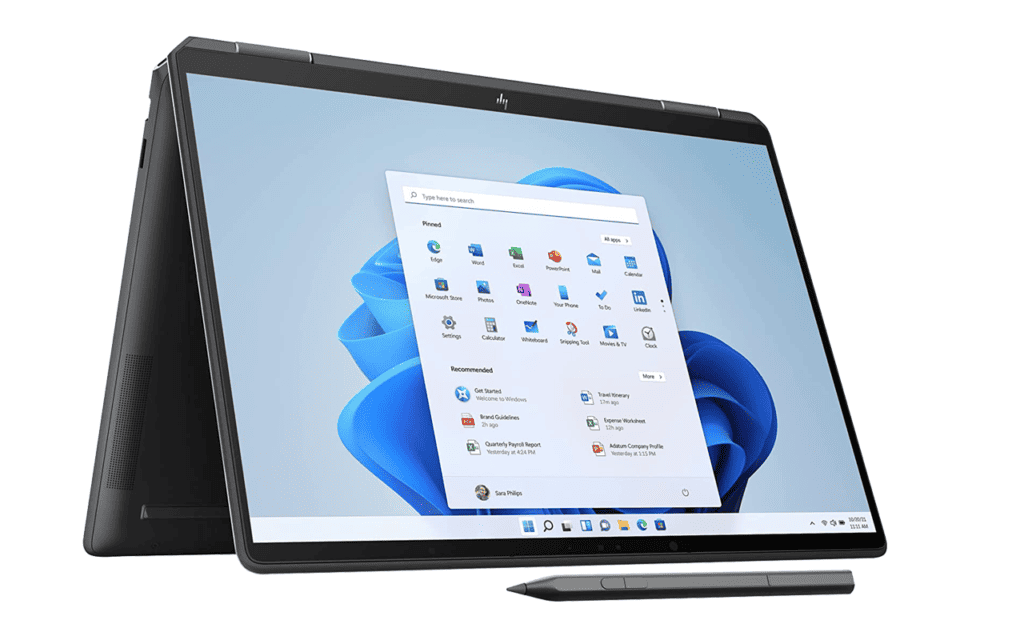
Overview:
The HP Specter x360 is a high-end laptop becoming increasingly popular with professionals and students who need a laptop that can handle complex computer science tasks.
This laptop has an Intel Core i7 processor, which is powerful enough to handle demanding applications like encoding, video editing, and 3D rendering.
The HP Specter x360 is also a lightweight laptop that’s easy to carry around, making it an excellent choice for those who are always on the go. The laptop also has an impressive battery life, so you can work on your projects without worrying about running out of power.
It also features the ability to open it at a 360-degree angle to become like a tablet, meaning it is a 2-in-1 laptop.
HP Spectre x360 Specs:
- Processor: 13th Generation Intel® Core™ i7 processor
- Graphic Card: Intel® Iris® Xᵉ Graphics
- RAM: 16 GB
- Storage: 1 TB PCIe® NVMe
- Screen: 13.5″ diagonal WUXGA+ touch display
- Battery Life: Up to 16 hours and 15 minutes
What I Like and Dislike about HP Spectre x360:
Like:
- Versatile Design
- Impressive Battery Life
- Display Quality
- High Performance
Dislike:
- Limited I/O Ports
- Cooling System
- Expensive
- Non-Upgradable
5. Apple Macbook Air

Overview:
The Apple Macbook Air is a powerful computer that has gained popularity among consumers due to its impressive features. This laptop caters to professionals and students who require high-performance computing.
The Macbook Air is an excellent choice for computer science students who need a reliable machine for coding, video editing, and other resource-intensive tasks.
The laptop has an Apple M1 chip and a fast and efficient processor. It also has a stunning Retina display that delivers clear and vibrant visuals.
The Apple Air is an excellent choice for individuals who require a powerful computer for professional or academic purposes.
Macbook Air Specs:
- Processor: Apple M1 chip
- Graphic Card: 7-core
- RAM: 8 GB
- Storage: 2TB
- Screen: Retina display
- Battery Life: Up to 18 hours of battery life
What I Like and Dislike about Apple Macbook Air:
Like:
- Security via Touch ID
- Brilliant Retina Display
- Great Battery Life
- Loaded with Necessary Applications
Dislike:
- Limited Hardware Upgrade
- High Priced
- Limited Upgradability
6. Lenovo ThinkPad X1 Carbon

Overview:
Lenovo’s ThinkPad X1 Carbon is a reliable laptop for students who need a powerful yet portable device. With its 12th Gen Intel Core processors and up to 16GB of RAM, this laptop can easily handle demanding tasks.
Even better, the X1 Carbon is budget-friendly, making it an ideal choice for students on a budget. It offers excellent value for its price point and provides all the essential features that students need for their coursework and projects.
The Lenovo ThinkPad X1 Carbon Gen 12 suits computer science students needing a reliable, powerful, and affordable laptop.
Lenovo’s ThinkPad X1 Carbon Specs:
- Processor: Intel Core i7-1260P
- Graphic: Intel Iris Xe Graphics
- RAM: 16 GB
- Storage: 512 GB SSD
- Screen: 14 inches 1920 X 1200 60HZ
- Battery Life: Up to 12 hours
What I Like and Dislike about Lenovo’s ThinkPad X1 Carbon:
Like:
- Strong and lightweight
- Productivity and long battery life
- Has USB-A, HDMI, and Thunderbolt 4 ports.
- Three-year warranty
- Minimal bloatware
Dislike:
- No slot is available for SD or microSD cards.
- The 5G option is currently unavailable.
- No Upgradability
- High surface temperatures under load
7. ASUS Zenbook Pro 14 Duo OLED
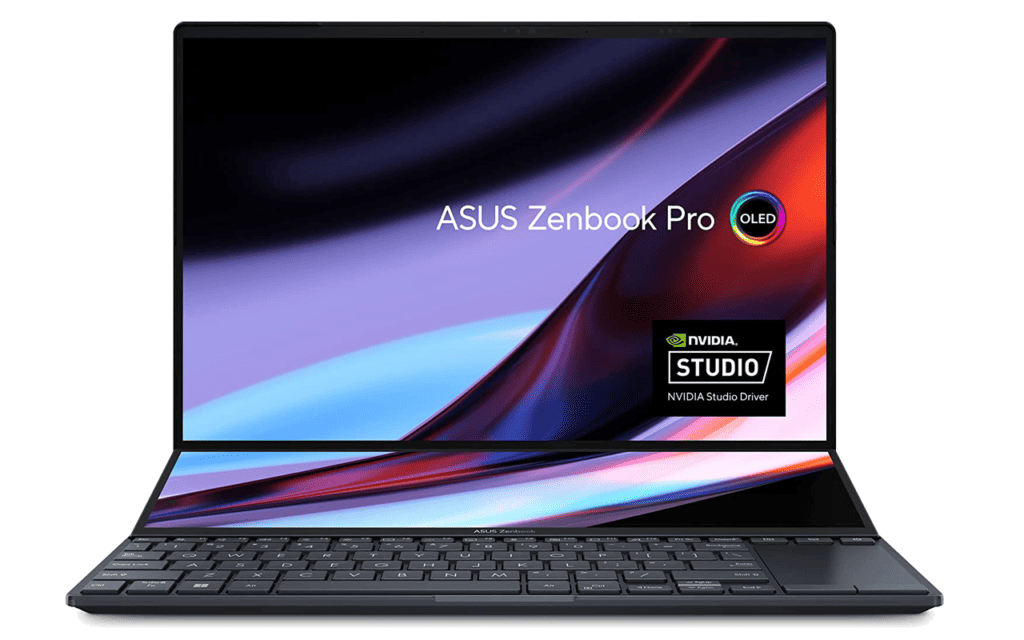
Overview:
ASUS Zenbook Pro 14 Duo OLED is a powerful laptop that has caught the attention of many tech enthusiasts; its innovative dual-screen design makes it a great choice for computer science students and professionals alike.
The main screen is a 14-inch OLED display that delivers crystal-clear visuals and vibrant colors, while the secondary screen is a touch-enabled display that sits above the keyboard.
This allows users to multitask with ease and increase their productivity.
The laptop runs on the latest Windows operating system, known for its reliability and user-friendly interface. Overall, ASUS Zenbook Pro 14 Duo OLED is an excellent investment for anyone looking for a powerful and versatile laptop.
And it’s a great computer science laptop and one of the best laptops.
ASUS Zenbook Pro 14 Duo OLED Specs:
- Processor: Intel Core i9-13900H
- Graphic: GeForce RTX 4060
- RAM: 32 GB
- Storage: 2 TB PCIe 4.0 x4 SSD
- Screen: Main: 14.5” 2.8K (2880 by 1800) 120 Hz \ Second: 12.7” 2.8K 120 Hz ScreenPad™ Plus
- Battery Life: 4.7 hours using the main screen and 3.6 hours using the primary and secondary screens.
What I Like and Dislike about Zenbook Pro 14 Duo OLED:
Like:
- Secondary ScreenPad Plus adds working space
- Good array of ports
- Excellent build quality
- Runs calm and quiet with daily use
- Loudspeakers
Dislike:
- No wrist rest
- Poor battery life
- No fingerprint reader
- Still narrow ScreenPad angles
8. Acer Nitro 5
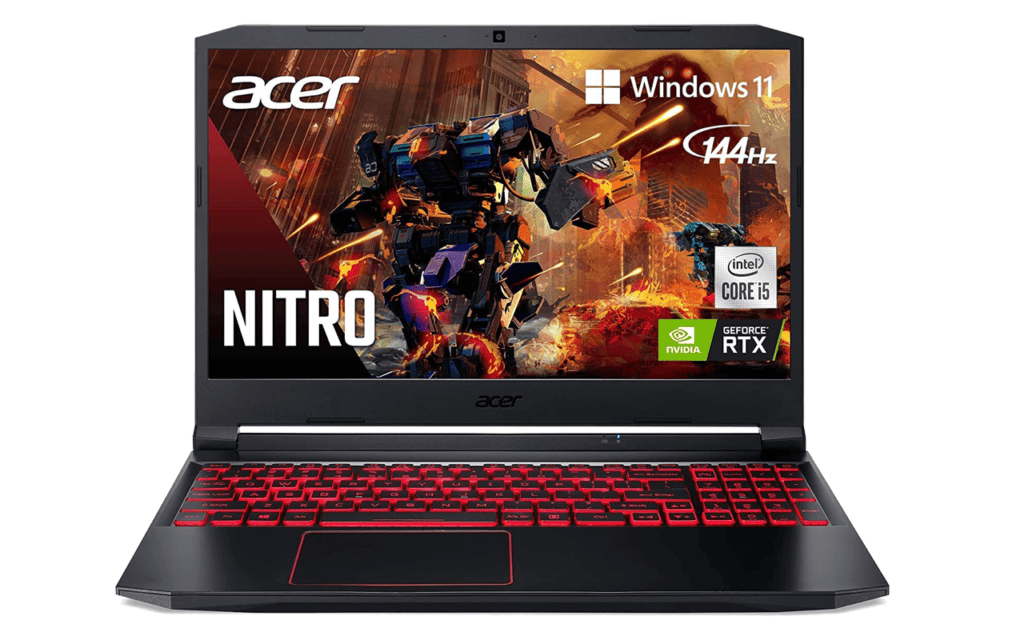
Overview:
If you’re interested in a gaming laptop that delivers high performance without burning a hole in your pocket, and you’re one of the CS students simultaneously, choose a laptop like the Acer Nitro 5.
With its sleek design and impressive specs, it’s no wonder why the Nitro 5 is such a popular choice for gamers.
This laptop can handle even the most demanding games and has an Intel Core i5-10300H processor and an NVIDIA GeForce RTX 3050 GPU.
The Nitro 5 also features a unique cooling system that prevents the laptop from overheating during extended gaming sessions. So if you’re looking for a computer that doesn’t break the bank but still delivers outstanding gaming and study performance, the Acer Nitro 5 is worth considering.
Acer Nitro 5 Specs:
- Processor: Intel Core i5-10300H
- Graphic: NVIDIA GeForce RTX 3050
- RAM: 8 GB
- Storage: 256 GB PCIe SSD
- Screen: 15.6″ QHD 144Hz 3ms IPS Display
- Battery Life: Up to 7 hours
What I Like and Dislike about Acer Nitro 5:
Like:
- Easy to upgrade or replace parts.
- Minimal performance loss over time.
- For avid gamers, a reliable, good cooling system
- Upgradability is available
Dislike:
- The screen looks dull and faded.
- Playing at lower graphics settings may be necessary to maintain a consistent frame rate.
- The battery life is relatively short.
9. ASUS 2021 VivoBook 15

Overview:
The ASUS 2021 VivoBook 15 is a powerful and versatile Windows laptop with impressive performance for both work and play.
Equipped with the latest Intel Core i7 processor, it can easily handle even the most demanding computer graphics and programming tasks; its slim and lightweight design makes this laptop perfect for professionals constantly on the go.
The 15.6-inch FHD display provides sharp and vivid visuals, making it ideal for watching movies, playing games, or working on complex projects. Whether you’re a graphic designer, programmer, or student, the ASUS 2021 VivoBook 15 is a laptop that can meet all your needs.
And you can assume it is a programming laptop.
ASUS 2021 VivoBook 15 Specs:
- Processor: Intel Core i7-1165G7
- Graphic: NVIDIA GeForce MX350 2GB
- RAM: 16 GB
- Storage: 512 GB PCIe SSD
- Screen: 15.6″ OLED 1920 x 1080 60Hz
- Battery Life: Up to 6 hours
What I Like and Dislike about ASUS 2021 VivoBook 15:
Like:
- Very portable.
- Good webcam video quality for video calls.
- Slim and Lightweight.
- Median Pricing
- Good performance.
Dislike:
- The battery lasts less than seven hours.
- USB-C does not support charging or video output.
- No backlit keyboard.
Can I use a tablet or 2-in-1 laptops for my computer science classes?
A common dilemma for computer science students is deciding whether to use a tablet or a 2-in-1 laptop for their programming needs. As technology advances, students have various options when purchasing a new laptop or tablet.
This can be both a blessing and a curse, as too many options can make it challenging to choose the best device for your academic journey. In this article, we will provide some advice and tips on making this decision and making the text as effective as possible.
Firstly, it is essential to consider your specific needs as a computer science student.
A laptop for programming usually requires a powerful processor, sufficient storage, and a comfortable keyboard for typing fast, making a new laptop an ideal choice. In contrast, tablets have portable designs and touchscreens, which can help take notes but may not provide the same functionality as a laptop for programming.
Best 2-in-1 devices offer the portability of a tablet and the power of a laptop, making them a popular choice for students who want the best of both worlds.
When considering laptops for CS students, it is essential to evaluate your budget and prioritize the features that are most important to you. Remember that performance and durability should be at the top of the list when choosing.
In conclusion, while a tablet or 2-in-1 laptop may suffice for your computer science classes, a new laptop tailored for programming needs may be the best choice.
However, if you prioritize portability, a best 2-in-1 device may be a suitable compromise. The key is to choose the best device that matches your needs and preferences while pursuing your academic goals.
FAQ:
Is a laptop enough for computer science?
A regular Windows or Mac laptop perfectly suits the initial two years of pursuing computer science. Despite not delivering cutting-edge performance, it unquestionably meets the requirements.
How much should I spend on a laptop for computer science?
Investing in a laptop is a significant decision for a computer science student. If you require a laptop for computer science purposes, including gaming with a GPU, a good laptop can cost between $800 and $1,500. However, you may only need to spend a little if you do not require a laptop for gaming, high-performance computing (HPC), or artificial intelligence (AI) applications.
How much RAM is suitable for computer science?
For optimal performance in serious gaming, engineering, science, and entry-level multimedia usage, a minimum of 32GB of RAM is required. With this amount of memory, memory-intensive programs can run smoothly, even with aging hardware. This is reasonable but rather necessary for the job at hand.
Is 8GB RAM enough for laptop computer science?
Your PC must have at least 8GB of laptop RAM to handle multiple demanding tasks such as gaming, graphic design, and programming. This will ensure that your PC runs smoothly without any hiccups.
Are gaming laptops good for computer science students?
Gaming laptops are perfect for computer science tasks since they have powerful processors and GPUs that handle demanding programming workloads. A gaming laptop is undoubtedly the best option for creating games or working on virtual reality applications.
What laptop specs do I need for computer science?
To ensure optimal performance, it is recommended that your hardware meets the following minimum requirements:
– Memory: at least 16GB, although the ability to install additional memory is desirable.
– Disk space: a minimum of 256GB, but it is recommended to have SSD 512 GB SSD or larger.
– Network: internet access and Wi-Fi are necessary for on-campus classes.
– USB ports: USB-A ports are necessary for peripheral connectivity. However, you need a USB-C to USB-A adapter if your laptop has no USB-A ports.
What size laptop screen is best for computer science?
You must consider your preferences and needs when choosing a laptop. If you use your device frequently outside of classes, a screen size of 17 inches may be the way to go. If you bring your laptop to class often, a smaller size, like 13 or 14 inches, would be more fitting. Be sure to factor in these critical aspects before deciding.
Is a bigger screen better for programming?
To achieve optimal usability, programmers require a significant amount of display space tailored to their needs. This means that larger, high-resolution monitors are an absolute must, as they offer superior pixel density compared to smaller displays.
Conclusion
When searching for the perfect laptop for computer science students in 2023, it’s essential to consider multiple factors. These include price, performance, screen size, battery life, and portability. Considering the rapid evolution of technology, it’s essential to keep up with the latest software and hardware requirements.
This article outlines top laptop options, including the MacBook Pro, Dell, Lenovo ThinkPad Carbon, and HP Spectre. Ultimately, the best choice will vary based on individual needs, preferences, and budget. As such, the most suitable laptop for computer science students in 2023 should be durable and reliable, offering the best value for money.

